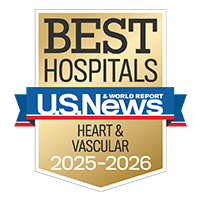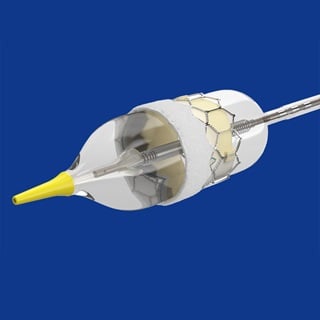Heart Valve Disease

Overview
What is heart valve disease?
There are four valves in your heart, the tricuspid, pulmonary, mitral and aortic. These valves are responsible for keeping blood moving in the right direction: They open and close to regulate blood flow into and away from the heart.
In heart valve disease, also called valvular heart disease, one or more of these valves doesn't open or close properly. This can affect how blood flows through the heart and to the rest of the body.
Our approach to heart valve disease
The UCSF Heart Valve Disease Clinic brings together highly skilled and experienced interventional cardiologists and cardiothoracic surgeons specializing in valvular heart disease. They thoroughly evaluate each patient and together decide on the treatment that best meets their needs. Their recommended plan may include lifestyle changes, medications, nonsurgical therapies, minimally invasive procedures or traditional surgery.
Early treatment is critical with valve disease. Our surgeons have tremendous success with mitral valve repairs in patients whose disease isn't advanced. We are experts in using valvuloplasty – a minimally invasive technique – to repair heart valves with narrowed openings.
Awards & recognition
-

Among the top hospitals in the nation
-

One of the nation's best for heart & vascular care
Causes of heart valve disease
Some people are born with heart valve problems, either because of a defect in the valve itself or as part of another heart condition. This is called congenital heart valve disease. But for most people with heart valve disease, the problem develops over time, with a number of contributing factors.
Risk factors for heart valve disease include:
- Age. Heart valves can thicken and stiffen as we get older.
- Bacterial endocarditis. This is an infection of the heart valves or the heart's inner lining caused by bacteria in the bloodstream.
- Coronary artery disease (CAD). This condition results from a buildup of fatty deposits called plaque narrowing the arteries that supply blood to the heart. CAD can damage the heart valves, particularly if the affected artery is the aorta.
- Family history. If you have a family history of heart problems – often defined as parents who had heart disease before age 55 or siblings who had it before the age of 65 – you're at a higher risk of developing heart valve disease.
- Heart attack. Valves may be damaged by a heart attack.
- Heart failure. Valves may be impaired as a result of heart failure.
- High blood pressure. When blood pressure is elevated for long periods, it can put too much pressure on the heart valves.
- High bloodstream cholesterol. When the blood has too much of certain kinds of cholesterol, plaque can build up in the arteries and affect valvular function.
- Excess weight or obesity. Being overweight can increase your risk of developing a heart condition that affects the valves.
- Radiation therapy. High doses of radiation can lead to calcium deposits on heart valves.
- Rheumatic fever. This condition can develop following certain bacterial infections and may scar the heart valves.
Types of heart valve disease
Heart valve disease is categorized by the type of problem it causes. The three types are:
- Regurgitation. The flaps of a heart valve (most often the mitral valve) don't close properly, allowing blood to leak backward into the heart.
- Stenosis. When the flaps of a heart valve become thick, stiff or stuck together, the valve can't open completely. As a result, blood can't get through in sufficient quantities. Aortic valve stenosis is the most common type of stenosis, affecting the valve that manages flow into the main artery that carries blood from the heart to the body (the aorta).
- Atresia. This can occur when the heart valve doesn't form properly and there isn't enough room for blood to pass through.
Symptoms of heart valve disease
Some people live their entire lives with a faulty heart valve and don't experience any problems. When symptoms do develop, they can include:
- Arrhythmia (an irregular heartbeat)
- Chest pain during physical activity
- Dizziness or fainting
- Rapid weight gain
- Shortness of breath
- Swelling in your feet, ankles, abdomen or neck
- Fatigue (feeling exhausted or constantly lacking energy)
Diagnosis of heart valve disease
Your doctor will check for heart valve disease by listening to your heart with a stethoscope. Abnormal sounds, such as a murmur or click, can indicate a valve problem. Based on the location of the sound, your doctor may know which heart valve is affected and whether the issue is regurgitation, stenosis or atresia. Your doctor may refer you to a cardiologist. To confirm the diagnosis, you'll likely have an echocardiogram (heart ultrasound), a test that uses sound waves to create detailed images of the heart.Treatment of heart valve disease
Treatment for heart valve disease can relieve strain on the heart and keep symptoms from getting worse. A range of treatments are available. The best choice depends on the specific problem, its severity, and whether it needs to be fixed or can be managed to keep the symptoms in check.
Most heart valve problems can be managed effectively with lifestyle changes, medications or surgery.
Medications for heart valve disease
If the problem with your heart valve isn't severe, your doctor may prescribe medications to manage your symptoms. These may include:
- Medications to lower high blood pressure, which can strain the heart
- Medications to control an abnormal heart rate
- Blood thinners to prevent or break down blood clots
- Antibiotics to prevent rheumatic fever or to treat infections that cause heart inflammation
Surgery for heart valve disease
Surgery may be the best treatment option, even if symptoms don't appear serious. The type of procedure depends on which valve is damaged, how badly it's affected, and whether the valve can be repaired or needs to be replaced. The method your doctor recommends will depend on your heart condition and overall health.
Heart valve repair is less risky than heart valve replacement, so when repair is possible, that's the preferred treatment.
Replacement valves for heart valve disease
For patients with aortic stenosis, UCSF offers transcatheter aortic valve replacement (TAVR). This minimally invasive procedure uses a catheter (a thin, flexible tube), which is threaded through a blood vessel (usually in the groin or chest) to reach the heart so that the doctor can place a new valve inside the damaged one, restoring healthy blood flow. TAVR takes much less time than open-heart surgery, and patients recover more quickly, with less pain and minimal scarring.
More treatment info
-

Ross procedure
This surgical treatment for aortic valve disease is the only one that restores normal life expectancy to patients under 60.
Learn more -

Transcatheter aortic valve replacement (TAVR)
This minimally invasive procedure makes it possible to replace a faulty aortic valve without the risks or long recovery of open-heart surgery.
Learn more
UCSF Health medical specialists have reviewed this information. It is for educational purposes only and is not intended to replace the advice of your doctor or other health care provider. We encourage you to discuss any questions or concerns you may have with your provider.











